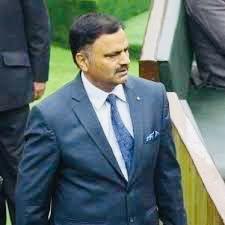Darbar Move to be Restored This Year: Cabinet Minister Javed Rana
Srinagar, August 23: The historic tradition of the Darbar Move is set to be reinstated this year, according to Cabinet Minister Javed Ahmad Rana, a senior member of the Omar Abdullah-led government in Jammu and Kashmir.
Speaking to a news agency in Srinagar on Saturday, Rana stated, “This year, we will restore the Darbar Move.”
When asked whether the upcoming Assembly session—expected to be convened in mid-September in Srinagar—was discussed during the Cabinet meeting held on Friday, the minister said, “A number of key issues were deliberated upon. While not all cabinet discussions can be made public, the meetings are focused on decisions that significantly impact governance and the public.”
The Darbar Move is a centuries-old administrative tradition introduced in 1872 by Maharaja Gulab Singh, the founder of the Dogra dynasty.
Under this system, the Civil Secretariat and other government offices would shift between Srinagar in the summer and Jammu in the winter, symbolizing the administrative unification of the region and aiming to maintain economic balance between the two capitals.
The practice was discontinued in 2021 by the LG Administration, citing fiscal savings of approximately ₹200 crore annually. The decision sparked widespread debate over its economic and symbolic implications, particularly for Jammu.
However, Chief Minister Omar Abdullah has consistently voiced his commitment to reviving the tradition. In December last year, he stated, “We assure the people that the Darbar Move will be restored. Jammu holds its own importance, and we will not allow its historical and economic significance to be diminished.”
Deputy Chief Minister Surinder Choudhary has also expressed strong support for the restoration, highlighting the tradition’s role in sustaining Jammu’s economy.
“The Darbar Move created employment opportunities by boosting local businesses, including hotels, transportation, and small industries. It was more than a government routine—it was an economic lifeline for many,” Choudhary said in a recent statement.
He further emphasized the tradition’s historical intent: “The Dogra Maharajas introduced this practice to ensure equitable development across regions. Our government respects that legacy and is committed to preserving it for the benefit of all citizens.”


Comments are closed.